Offshore Financial Centres Can Help Curb Illicit Flows by Exchanging Tax Information and Providing Transparent Beneficial Ownership Information
In its recent op-ed, Jersey Finance provides a defence of the offshore financial centre’s legal code and regulatory framework against charges by “pressure groups” of alleged financial improprieties. The author also promotes Jersey’s financial services to current and potential clients that intend to invest in Africa.
However the article’s logic is flawed. It suggests that since Jersey is an international finance centre with allegedly tough anti-money laundering laws to help prevent wrongdoing, other IFCs are also proper places to facilitate investments in the developing world. One need only search “Swiss leaks” or “Lux leaks” to understand more clearly how taxes are dodged, money laundered, and financial secrets kept around the globe. Secret bank accounts, anonymous corporations, fraudulent foundations, nominee trust accounts and other opaque structures are the calling cards of many IFCs and are utilised by any firm or person who wants to move, hide or launder money.
By Tom Cardamone, July 2, 2015
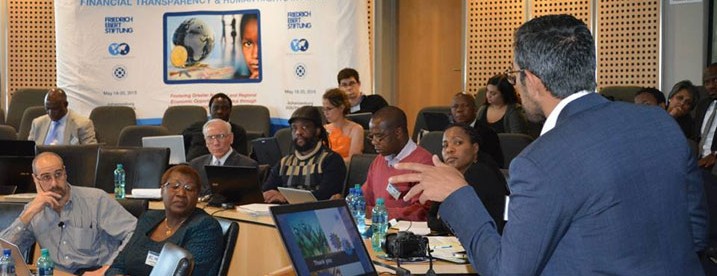
A Quarterly Newsletter on the Work of Global Financial Integrity from April to June 2015
Global Financial Integrity is pleased to present
GFI Engages, a quarterly newsletter created to highlight events at GFI and in the world of illicit financial flows. We look forward to keeping you updated on our research, advocacy, high level engagement, and media presence. The following items represent just a fraction of what GFI has been up to since March, so make sure to check our
website for frequent updates.
Joint Conference in Johannesburg: Financial Transparency and Human Rights in Africa
The Friedrich-Ebert-Stiftung (FES), Global Financial Integrity (GFI), and the International Bar Association’s Human Rights Institute (IBAHRI) partnered to host a three-day conference in Johannesburg, South Africa fromMay 18-20. The conference featured special expert-level discussion on the connection between human rights and illicit financial flows in Africa and the legal, advocacy, and academic channels for leveraging these connections to effect change.
Panelists and keynote speakers were drawn from around Sub-Saharan Africa and across the globe, covering a broad range of topics within the financial transparency-human rights overlap, including natural resources, violent conflicts, long-term development consequences, and the ongoing Sustainable Development Goal (SDG) process.

G7 Communiqué Ignores Illicit Flows in the Context of the Post-2015 Development Agenda
World Leaders Urged to Target Illicit Flows, Trade Misinvoicing at FfD Conference
WASHINGTON, DC – Global Financial Integrity (GFI) expressed disappointment in world leaders Monday for failing to advance efforts to curtail illicit financial flows—particularly in the context of the Post-2015 Development Agenda. The G7 failure comes despite a new GFI study released on Wednesday showing the outsized-impact that illicit financial flows (IFFs) have on the poorest countries in the world, and notwithstanding a Friday pledge by UK Prime Minister David Cameron to put corruption on the agenda of the G7 Summit, which concluded today in Germany.
By Tom Cardamone, June 4, 2015
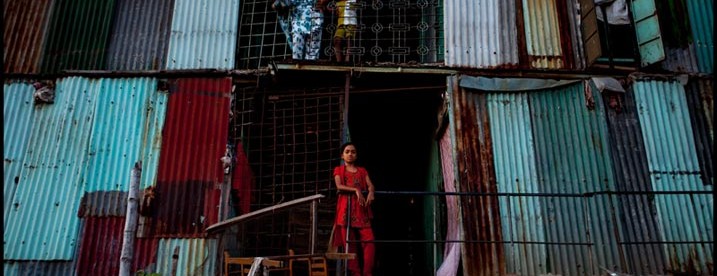
Illicit Financial Flows Have a Devastating Impact on the Poorest Countries in the World
What do you do when “the big number,” used to estimate the global volume of illicit financial flows (IFFs), begins to lose its luster?
Over the past year or so, GFI has begun to hear—in various venues and by various people—the warning to audiences that they shouldn’t “focus on the big number.” A trillion dollars is a global number, these observers say, and can’t be used to assess the impact at the country level. Or, they contend, the trillion dollars in IFFs is from a cluster of emerging market countries and therefore is skewed to make it look as though all developing countries have huge problems when really only a few do. GFI decided to go back to the data to see if the criticisms were accurate.
As a result, this week we are publishing “Illicit Financial Flows and Development Indices: 2008–2012,” a study that looks at illicit flows from the poorest countries to determine the development impact in those places that do not appear on the top-10 list of IFF-source nations by gross volume. Rather than focus on the Chinas and Russias and Mexicos of the world, we examined IFFs in nations that appear, for example, on the Least Developed Countries list or the Highly Indebted Poor Countries list—82 countries in all were examined. What we found was simply alarming.

Illicit Financial Flows Have “Outsized Impact on Poorest Countries”
FfD Negotiators Urged to Target Illicit Financial Flows and Trade Misinvoicing
WASHINGTON, DC – Illicit financial flows (IFFs), stemming from crime, corruption, and tax evasion, have an outsized impact on the world’s poorest countries, according to a new study released today by Global Financial Integrity (GFI), a Washington, DC-based research and advisory organization. Titled “Illicit Financial Flows and Development Indices: 2008–2012,” the report also finds strong correlations between higher illicit outflows and higher levels of poverty and economic inequality.
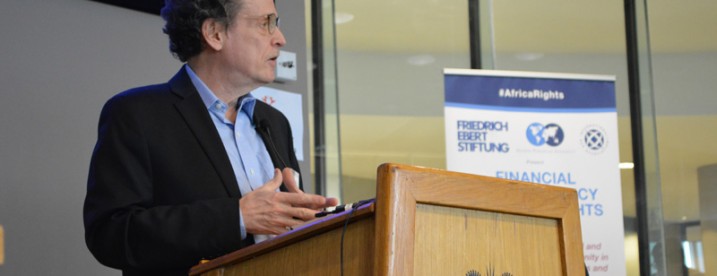
In May 2015, Professor Thomas Pogge delivered the keynote address at a conference, titled “Financial Transparency and Human Rights in Africa: Fostering Greater National and Regional Economic Opportunity in Africa through Human Rights and Financial Transparency,” co-hosted by Global Financial Integrity, the Friedrich-Ebert-Stiftung (FES), and the International Bar Association’s Human Rights Institute (IBAHRI) in Johannesburg, South Africa.
A member of GFI’s Board of Directors, Dr. Pogge is the Director of the Global Justice Program and the Leitner Professor of Philosophy and International Affairs at Yale University.
By Tom Cardamone, April 23, 2015
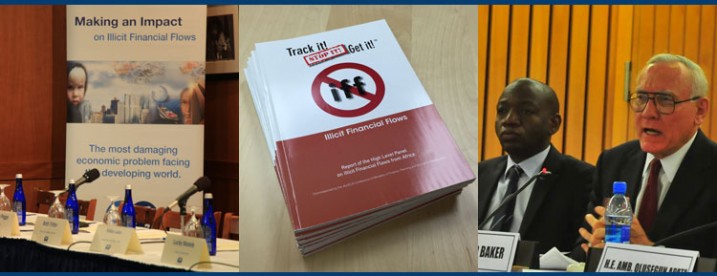
A Quarterly Newsletter on the Work of Global Financial Integrity from January through mid-April 2015
Global Financial Integrity is pleased to present GFI Engages, a quarterly newsletter created to highlight events at GFI and in the world of illicit financial flows. We look forward to keeping you updated on our research, advocacy, high level engagement, and media presence.
The release of this quarter’s newsletter was delayed in order to include the high level roundtable GFI held on April 17. The following items represent just a fraction of what GFI has been up to since December, so make sure to check our website for frequent updates.
GFI’s High Level Roundtable: IFFs, FfD, and SDGs: Global Perspectives
Global Financial Integrity was pleased to host a high level roundtable on April 17 that focused on the relationship between illicit financial flows (IFFs), Financing for Development (FfD), and the Sustainable Development Goals (SDGs). Respected members of the public, private, academic, civil society, and multilateral sectors from around the world provided their perspectives on how to tackle IFFs, improve domestic resource mobilization, and strengthen the development of financial management.
By Tom Cardamone, March 18, 2015
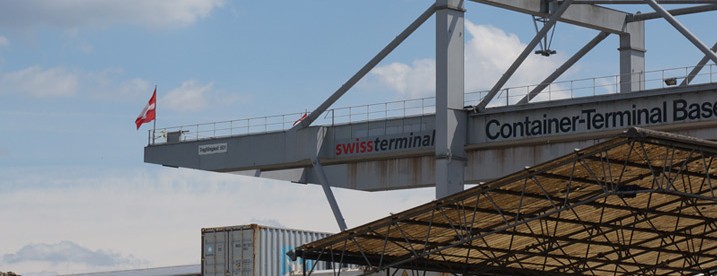
The “Zero Draft” of the Financing for Development Conference Outcome Document Should be Improved to Aim to Halve Illicit Flows from Trade Misinvoicing
On Monday, the United Nations released a so-called “Zero Draft” of the Financing for Development (FfD) Conference Outcome Document. Simply stated, this draft lays out the current political consensus on a vast array of development issues including how to address the growing problem of illicit financial flows (IFFs). It is by no means the final word on IFFs—or any other issue for that matter—but it gives a good indication where things are heading.
The draft proposes three specific steps to address IFFs, including:
- Developing “a proposal for an official definition of IFFs”,
- Developing “a proposal to publish official estimates [of IFF] volumes and breakdown,” and
- An international effort to “substantially reduce” the flow of IFFs.
These measures go a long way toward addressing a problem that has captured the attention of the development community over the last few years. For example, in 2013 the World Bank noted that “there is little doubt” that IFFs have a caustic effect on development, and last year the African Union noted that “it is imperative to curtail” illicit flows.







